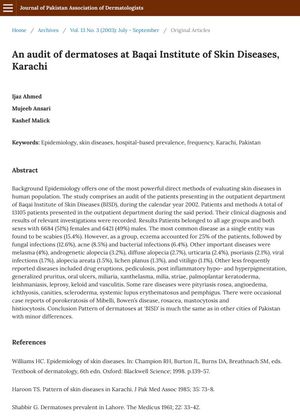TLDR The most common skin condition at the Baqai Institute in Karachi was scabies, and eczema was the most prevalent group of diseases.
In 2002, a study was conducted at the Baqai Institute of Skin Diseases in Karachi, Pakistan, involving 13,105 patients. The patients were of all age groups and both sexes, with 51% being female and 49% male. The most common disease found was scabies (15.4%), but as a group, eczema was the most prevalent, accounting for 25% of patients. This was followed by fungal infections (12.6%), acne (8.5%), and bacterial infections (6.4%). Other notable diseases included melasma (4%), androgenetic alopecia (3.2%), diffuse alopecia (2.7%), urticaria (2.4%), psoriasis (2.1%), viral infections (1.7%), alopecia areata (1.5%), lichen planus (1.3%), and vitiligo (1.1%). The pattern of dermatoses at the institute was found to be similar to other cities in Pakistan, with minor differences.
 3 citations
,
June 2006 in “Expert Review of Dermatology”
3 citations
,
June 2006 in “Expert Review of Dermatology” The document concludes that hair loss is complex, affects many people, has limited treatments, and requires more research on its causes and psychological impact.
 9 citations
,
April 1986 in “Postgraduate Medicine”
9 citations
,
April 1986 in “Postgraduate Medicine” Hair loss has many causes and treatments, and losing some hair daily is normal; proper diagnosis is key, and minoxidil can help treat it.
 24 citations
,
March 2017 in “Journal of The European Academy of Dermatology and Venereology”
24 citations
,
March 2017 in “Journal of The European Academy of Dermatology and Venereology” Finasteride use linked to increased risk of sexual dysfunction, especially in younger people.
 1 citations
,
February 1988 in “The BMJ”
1 citations
,
February 1988 in “The BMJ” The document explains different hair and scalp conditions, including common hair loss after pregnancy or illness, drug-induced hair loss, hereditary excessive hair growth, patterned baldness, autoimmune hair loss, and permanent loss due to skin disease, with generally limited treatment options.
 77 citations
,
March 2001 in “Clinics in Dermatology”
77 citations
,
March 2001 in “Clinics in Dermatology” Androgenetic alopecia involves genetics, hormones, and can be treated with medications or surgery.
 91 citations
,
August 2015 in “Anais Brasileiros De Dermatologia”
91 citations
,
August 2015 in “Anais Brasileiros De Dermatologia” Female Pattern Hair Loss affects women's self-esteem and needs more research for better treatment.







